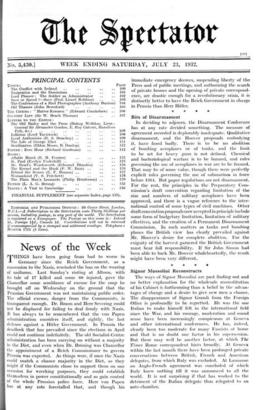Bits of Disarmament In deciding to adjourn, the Disarmament Conference
has at any rate decided something. The measure of agreement recorded is deplorably inadequate. Qualitative disarmament, and the Hoover proposals embodying it, have fared badly. There is to be no abolition of bombing aeroplanes or of tanks, and the limit to be set for heavy guns is not defined. Chemical and bacteriological warfare is to be banned, and rules governing the use of aeroplanes in war are to be framed. That may be of some value, though there were perfectly explicit rules governing the use of submarines in force before 1914. But paper regulations are not disarmament. For the rest, the principles in the Preparatory Com- mission's draft convention regarding limitation of the size and numbers of military aeroplanes have been approved, and there is a vague reference to the inter- national control of some types of civil machines. Other draft convention proposals now accepted in principle include some form of budgetary limitation, limitation of military effectives, and the creation of a Permanent Disarmament Commission. In such matters as tanks and bombing planes the British view has clearly prevailed against Mr. Hoover's desire for complete abolition. For the exiguity of the harvest garnered the British Government must bear full responsibility. If Sir John Simon had been able to back Mr. Hoover wholeheartedly, the result might have been very different.














































